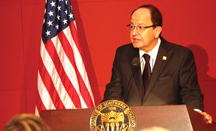By Amy E. Hamaker

USC President C. L. Max Nikias describes USC’s strengths and challenges at his annual address to the Health Sciences Campus faculty on Feb. 11.
Photo/Tom DeSanto
The future of online education in higher learning, the global and local nature of university activities and the reintroduction of humanistic principles were topics touched on by USC President C. L. Max Nikias, PhD, in his address to Health Sciences Campus faculty on Feb. 11 at Aresty Auditorium.
Nikias discussed the changing face of higher learning, noting that online courses at USC are leading the way in terms of maintaining academic rigor and integrity. USC will not offer massively open university courses or online degrees for undergraduates, he said.
However, USC’s masters, executive and graduate programs will reach 7,600 students globall
y and bring in $123 million in revenue this year, a figure that is unprecedented for a top American research university.
Nikias expects that all USC schools will have some online offerings by next year, and hopes to double enrollment and degree offerings online over the next five years.
The president also cited notable achievements for the USC community, including:
USC’s freshman class continues to be outstanding: The university received 51,000 applications for 2,600 freshman slots, and of those accepted, more than 600 received perfect grade point averages in high school. “We have more Cal Tech freshman than Cal Tech itself,” joked Nikias.
USC has the world’s largest contingent of international students, hailing from 115 nations; most of USC’s current freshmen come from outside of California.
USC remains an “intellectual magnet for talent,” said Nikias, citing the recruitment of Arthur W. Toga, PhD, and Paul Thompson, PhD, and their Laboratory of Neuro Imaging, and the appointment of Rohit Varma, MD, MPH, as chair of the Department of Ophthalmology and director of the USC Eye Institute, with Mark Humayun, MD, PhD, returning full-time to a leading research role.
Exciting growth continues, with the recent USC Pacific Asia Museum alliance, the new USC Parker Institute for Childhood Cancer and the building of the USC Village student and retail space and Norris Healthcare Consultation Center.
Funding for USC research is at an all-time high, with more than $120 million in high-profile research grants coming to USC during the past three years.
The $6 billion Campaign for USC reached the $3 billion mark late last fall, with three years left to go. Half of the funds came as the result of 23 transformative gifts of $25 million or more; the other half came from 208,000 donations from members of the Trojan Family, including $738 million from USC parents.
Patient care at the University has been delivered largely on a local level, said Nikias, noting that although entities on the Health Sciences Campus already draw 1 million patients a year, it has barely scratched the surface of its potential.
“We are intensifying our efforts to make Keck Medicine the leading academic medical center of the Pacific Rim,” he said. “USC is now a rising power in medicine, interdisciplinary health and patient care during a time when medical science is moving to the forefront.”
Overall, Nikias believes that USC should be guided into the future following five fundamental principles:
• showing an unwavering commitment to academic quality and integrity in online education;
• seeking financial viability in everything;
• becoming pacesetters in patient care and experimentation;
• knowing when to be global and when to be local; and
• continuing to lead the way nationally in reviving the humanities and arts.
“I believe we at USC make a noble and powerful statement to our peer institutions and to our world when we reaffirm an unwavering loyalty to our humanistic principles as we explore the newest intellectual frontiers,” he said.
“USC has reached full maturity; there is no one else to chase now,” Nikias added. “There is no one else to copy. The roads we choose from here on out, we choose based on what we believe to be best for our future and for American higher education. Our faculty is the foundation of all scholarly excellence. They do much of their best work in close collaboration on campus, and the results are gaining international recognition.”


